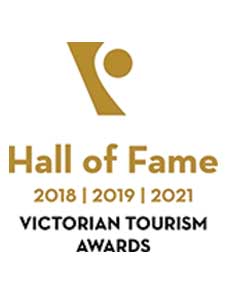Program outline |
|
| Educator-led Sessions
90 mins total |
Up-close encounters with classroom reptiles and invertebrates |
| Guided walk through the Park to observe and learn about Australian mammals and birds.
Observe physical characteristics, behaviour, life cycle strategies, and habitats of animals to determine patterns and identify categories they belong to. Observe behavioural and physical adaptations to predict what environments different animals may be suited to – appreciate the struggles and successes of surviving in diverse Australian environments. Learn about Science and Conservation work in the context of Moonlit Sanctuary’s Breeding programs for endangered wildlife. Understand the threats faced by both endangered and non-threatened species. We will introduce the internally accepted means of categorising the “Conservation Status” of species, and explore the methods currently used to promote the survival of our unique wildlife. Students will be presented with stimulating inquiry questions, and be empowered to form opinions about – and suggest – possible solutions, on personal, community and global scales. |
|
| Teacher-led Sessions 30/45 mins total | Wallaby Walk
Groups will be provided with Roo-food and an identification sheet so that students may observe, identify, interact with and potentially feed our free roaming wallabies and kangaroos. |
2025 PRICES
90 minute program – cost per student including admission: $21.50
The Rarer and Rarer program includes 90 minutes of educator-led sessions, plus a teacher-led session to visit the Wallaby Walk.
The excursion includes reserved undercover seating.
Extra adults over the below ratios: $23.00 (to a maximum of 1:1)
NOTE: all programs have a minimum charge for 17 students per group – even if fewer attend on the day.
All prices include GST
ADULT TO STUDENT RATIO
Grade 3 and above: 1 adult is included free of charge for every 10 students (rounded up to the next 10)
Carers and Aides (for people with physical or learning needs): 1 included per student
Learning aides do not affcet ratios
Extra adults over the above ratios: $23.00 (to a maximum of 1:1)
RESOURCES
On the day a Wallaby Walk Guide will be provided to leading teachers, and other supervising adults to assist them in facilitating the teacher-led session.
Digital copies of this resource can be found here: Guide to Wallaby Walk
GROUP SIZE, STUDENT NUMBERS, TIMETABLE
- We can run programs for 1 to 6 groups/classes
- There is a minimum charge for 17 students per group (invoiced for 17 per group even if fewer attend).
- There is a maximum of 30 students per group
- Schools with more than 6 classes, or more than 150 students, can visit over multiple days
Please contact us for more information and to see example timetables.
Curriculum Links
Our Rarer and Rarer Program is specifically targeted to Grades 3 to 6 and caters to the curriculum descriptors shown below.
| Victorian Curriculum | Levels 3 and 4 | Levels 5 and 6 | |
| Science | Biological Science | Living things can be grouped on the basis of observable features and can be distinguished from non-living things (VCSSU057) | Living things have structural features and adaptations that help them to survive in their environment (VCSSU074) |
| Different living things have different life cycles and depend on each other and the environment to survive (VCSSU058) | The growth and survival of living things are affected by the physical conditions of their environment (VCSSU075) | ||
| Science as a human endeavour | Science knowledge helps people to understand the effects of their actions (VCSSU056) | Scientific understandings, discoveries and inventions are used to inform personal and community decisions and to solve problems that directly affect people’s lives (VCSSU073) | |
| Questioning and predicting | With guidance, identify questions in familiar contexts that can be investigated scientifically and predict what might happen based on prior knowledge (VCSIS065) | With guidance, pose questions to clarify practical problems or inform a scientific investigation, and predict what the findings of an investigation might be based on previous experiences or general rules (VCSIS082) | |
| Cross Curriculum Priorities | Learning about Sustainability | ||
| Learning Capabilities | Critical and Creative Thinking | ||
| Ethical | |||







